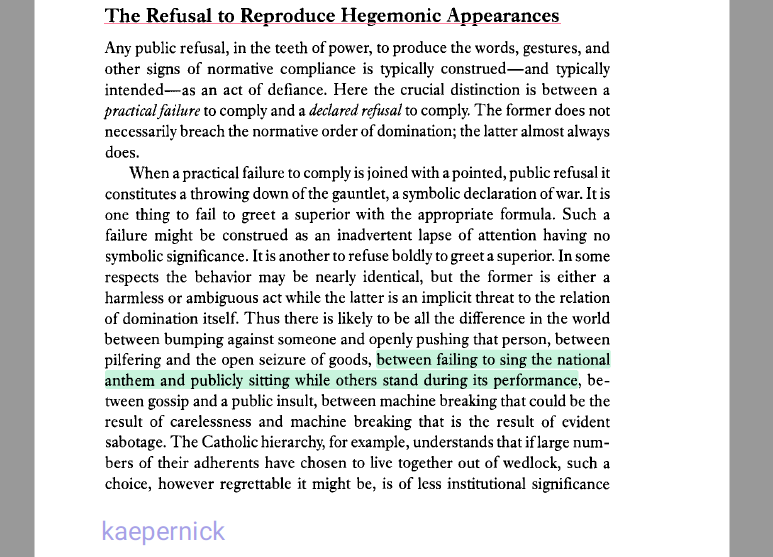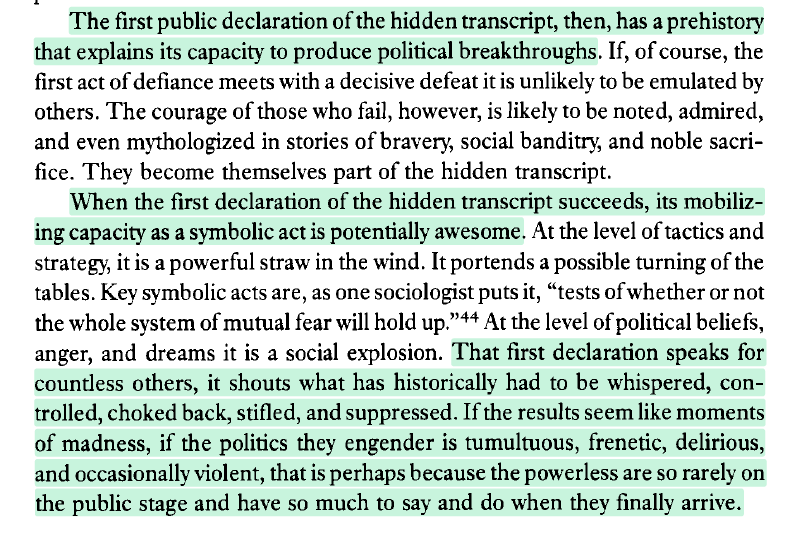It just so happens that on Tuesday I read James Scott& #39;s 1990 book "Domination and the Arts of Resistance: Hidden Transcripts." It is an instructive text in this moment.
His goal with the book is clear enough: "My broad purpose is to suggest how we might more successfully read, interpret, and understand the often fugitive political conduct of subordinate groups."
Scott later says that the *public* interactions between oppressed people and their oppressors adhere to a "public transcript." The flip side is this: both oppressors and oppressed have "hidden transcripts" that they keep from view of each other.
Also: the oppressed perform the & #39;hidden transcript& #39; in public, but in covert, undetectable ways to the oppressors.
A good example of the hidden transcript is Smokey in Friday, once Deebo leave and he say: "One day somebody gone knock his ass out. He be like & #39;shut up.& #39; And I be quiet. But when he leave, I be back talking again."
I swear to you that the "hidden transcript" concept is no more complex than that scene from Friday.
The majority of the chapters Scott goes into nuances about it, but that& #39;s the overall point: the dominated/oppressed/subjugated group have a vested interest in & #39;maintaining appearances& #39; but remove their masks when safe to do so, during which time they might fantasize revenge.
The last chapter of the book can explain what& #39;s happening in Minneapolis and what happened in Ferguson; and what did not happen in Michigan or Kentucky when white men with assault rifles stormed their capitol buildings.
The state-market cannot respond with violence to these men, because the social and political positions they hold are actually in alignment with the ruling class. It would be a contradiction in terms for the police/natl guard to respond to them like they did in Ferguson.
Likewise, and Scott is incisive here: every now and again, the hidden transcript makes it onto the & #39;public stage.& #39; Once it does, all hell is liable to break loose. See this passage from page 203.
@bomani_jones makes the point and it& #39;s a great one: Kaep wasn& #39;t thrown out of the league for taking a knee during the anthem, he was thrown out for demanding justice for Black people killed by the cops.
Kaep expressed publicly what (some) other Black athletes had saying in private. He put the & #39;hidden transcript& #39; of the oppressed on a public stage. If not met with reprisal, it could provoke more violations of the public transcript.
So the other oppressed people, who normally are read as silent, invisible, or unconcerned with & #39;politics& #39; are then activated into action. Hence the Ferguson rebellion was led by many people who worked at pharmacies, fast food, and other grossly exploited places of employment.
Read this last page of the book, page 227, and watch it bring into view what& #39;s happening in Minneapolis, Baltimore before that, Ferguson before that, Detroit and Newark in 1967, Cleveland in 1966, and Watts in 1965.
"The first public declaration of the hidden transcript, then, has a prehistory that explains its capacity to produce political breakthroughs...When the first declaration of the hidden transcript succeeds, its mobilizing capacity as a symbolic act is potentially awesome...
...That first declaration speaks for countless others, it shouts what has historically had to be whispered, controlled, choked back, stifled, and suppressed. If the results seem like moments of madness, if the politics they engender is tumultuous, frenetic, delirious, and...
...occasionally violent, that is perhaps because the powerless are so rarely on the public stage and have so much to say and do when they finally arrive." 227

 Read on Twitter
Read on Twitter



